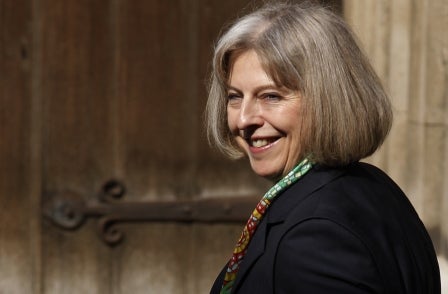
Criminal suspects who have been arrested should not normally be named until they are charged, the Home Secretary has said.
In a letter to the recently formed professional standards body, the College of Policing, Theresa May said she was concerned by reports that some forces have refused to name suspects who have been charged.
But May said she does believe in protecting the identities of suspects at point of arrest and has asked the College, led by chief executive Alex Marshall, to draw up clearer guidance.
However, confusion emerged when David Cameron appeared to offer a conflicting view to the Home Secretary's as he insisted there should be a "working assumption" that police name suspects who have been arrested.
The Prime Minister spoke out amid concern that police forces are increasingly taking a default position of withholding identities of those arrested and even charged, although his spokesman insisted he agrees with Mrs May.
The Home Secretary wrote: "I am concerned that the refusal of some police forces to name suspects who have been charged undermines transparency in the criminal justice system and risks the possibility that witnesses and other victims might not come forward.
"I strongly believe that there should be no right to anonymity at charge apart from in extremely unusual circumstances.
"I believe there should be a right to anonymity at arrest, but I know that there will be circumstances in which the public interest means that an arrested suspect should be named."
Warwickshire Police came under fire for initially refusing to name a retired police officer charged with theft.
Warwickshire Police, who eventually performed a U-turn and revealed the identity of the retired officer facing the allegations as Paul Greaves, originally claimed they had altered guidance in the wake of the Leveson Inquiry into press standards.
Addressing this issue, May wrote: "I understand the Leveson Inquiry might have had an effect on the behaviour of police forces.
"In fact, Lord Leveson's report did not make any substantive recommendations in relation to anonymity so I would like police forces to be aware of this fact."
Speaking to reporters during his US trip, the Prime Minister said the issue was "long-standing".
He said: "I know some people want to connect it specifically with Leveson.
"But actually it's a long-standing debate about how to get the balance right between making things public, which as Theresa has said should be the working assumption, but also respecting privacy where that is appropriate.
"It's a very difficult balance to get right. On the one hand, sometimes making public the details of the arrest can help to bring forward evidence and bring forward potential victims.
"Therefore it is completely in the public interest.
"Sometimes it is right to respect the privacy of the individual because the publicity around these sorts of arrests can be genuinely life changing.
"There is no simple answer to this."
Cameron said there have been "terrible events" following the naming of arrested suspects and alluded to the case of Christopher Jeffries, who sued several newspapers for their coverage of his arrest on suspicion of the murder of Joanna Yeates in Bristol.
Another man, Vincent Tabak, was ultimately found guilty of the landscape architect's murder.
Cameron added: "But I saw Theresa's approach in advance and I think it's the right one."
Warwickshire's decision not to name Greaves sparked fierce criticism from the region's deputy police and crime commissioner, Eric Wood, who said he was "extremely disappointed".
Freedom of expression campaigners also attacked the decision, understood to be the first such move by any police force in the country, arguing that it went against the UK's principle of open justice.
Greaves has been charged with the theft of £113,000 from the former Warwickshire Police headquarters at Leek Wootton and will appear before magistrates in Leamington Spa on May 22.
Email pged@pressgazette.co.uk to point out mistakes, provide story tips or send in a letter for publication on our "Letters Page" blog
